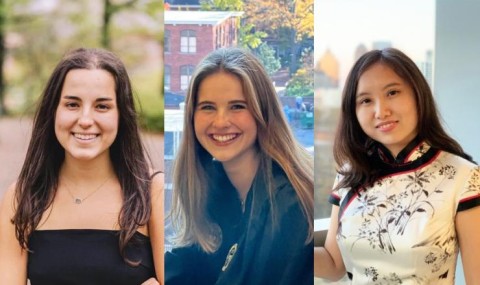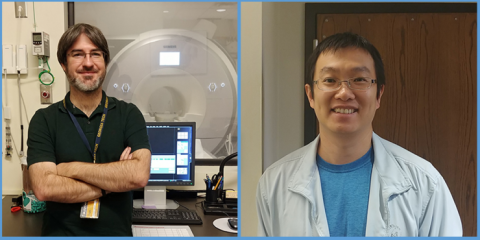


Chances are we all know someone who gets lost easily and often: people who move to a new city or walk into an office building and have no idea where to go — and even after several trips they continue to take wrong turns and spend time searching. Others, however, seem to have a built-in GPS, finding their way and instinctively discovering shortcuts. What could account for these individual differences?
A recent paper by an interdisciplinary team of authors from the School of Psychology and the School of Economics at Georgia Tech discovered that through psychology and neuroscience, good navigators often use a bird’s eye view perspective to organize and remember different places in the environment and have a map-like representation of the environment in their mind. Bad navigators on the other hand, often use a route-based, or turn-by-turn, strategy to learn the environment, making their representation of the environment much less configural.
Reinforcement learning
“A comparison of reinforcement learning models of human spatial navigation,” recently published in Nature Scientific Reports, explores reinforcement learning (RL), a popular type of machine learning algorithm which the famous AlphaGo is built on, to further investigate these individual differences in spatial navigation.
Academic Professional and first author Qiliang He explained, “What RL can offer — whereas other traditional measurements can’t — is that RL can quantify how much a navigator relies on their ‘map-like’ representation and how much they rely on their ‘turn-by-turn’ knowledge to go from Point A to Point B. It’s a number between 0 to 1, with 0 indicating complete reliance on turn-by-turn knowledge and 1 indicating complete reliance on map-like knowledge.” He added that the study combines psychology and computer science/data science.
“The critical thing which RL brings to the table for human navigation research is it helps us interpret how ‘adaptive’ a person’s strategy is,” noted Assistant Professor of Psychology Thackery Brown. “For example, sometimes navigating a well-learned route is just as efficient as any other path we might come up with to reach a goal — in this case, the person navigating that route isn’t necessarily a bad navigator, but may actually be allocating their brain’s resources in the most efficient way.”
Brown added that in the study, RL was used to characterize how someone’s current navigational choices relate to 1, the quickest option to reach a goal and 2, how this option seems to build on their past experiences. “We can get a much richer understanding of why a navigator chooses the path that they do and how efficient it is in terms of their current understanding of the environment.”
Undergraduate researchers — and co-authors
The paper is unique in that it combines an interdisciplinary group of authors, and that co-authors include two undergraduate students. In addition to Brown and He, co-authors of the paper included undergraduates Lou Eschapasse, who is studying Neuroscience in the College of Sciences with a concentration in Biomedical Engineering in College of Engineering; and Neuroscience major Elizabeth H. Beveridge. The team also included then-graduate student Jancy Ling Liu, formerly mentored by Brown, who is now with the Georgia Tech School of Economics Ph.D. program.
“[The] two undergraduate students contributed significantly to the research, earning authorship in the paper,” said Tansu Celikel, professor and chair of the School of Psychology. “This is a great example of the research ecosystem available to undergraduates at Tech.”
“In our lab, we place great responsibility on the Georgia Tech undergrads who work with us, and they flourish under this real sense of ownership of the studies which we conduct,” said Brown. “In my time as a professor we have had many majors from across the breadth of programs at GT — and Elizabeth and Lou are perfect examples of how brilliant, motivated, and well-trained our students are in neuroscience, psychology, and the related disciplines.”
“The undergraduate research assistants provided very helpful suggestions during the conceptualization stage of the project,” said He. “[They] collected most of the data, and participated in the writing and revision of this paper.”
Elizabeth Beveridge, one of the undergraduate research assistants, has published three papers with Brown and He, won the PURA (President's Undergraduate Research Award) twice, and has her thesis under invited revision in a prestigious psychology journal. Beveridge's fellow undergraduate research assistant, Lou Eschapasse, has published two papers, and has finished a follow-up study on neuroimaging.
“I think these are both great examples of the research ecosystem available to undergraduates at GT, even during the time when we couldn’t meet face to face,” said He.
“I always knew I wanted to get involved in research, so I reached out to Professor Brown during my fall semester of freshman year. As a neuroscience major, I have always been interested in memory and how we use those past experiences to make decisions,” Beveridge shared. “I feel so lucky to be named as a co-author, and I am extremely appreciative of Professor Brown and Qiliang He. They have been amazing mentors and taught me so much about research throughout college.”
Good navigators
The team's study was conducted between February 2020 and September 2020, at the time COVID was first reported in the United States. “We discussed this project via an online meeting platform during the pandemic and we deployed this project into apps that could work on participants’ Windows and Mac computers,” He said.
Besides using an objective way to quantify navigation strategy, He explained that they were also interested in how consistently people were using their ‘default’ strategy. “We hypothesize that good navigators not only use map-like strategy more often, but also adaptively change their strategy according to the environmental characteristics. We reason that the changing navigation strategy can be good but also cognitive demanding (i.e., using more cognitive resources, or to think harder).”
He explained that they predict that in a stable, predictable environment, good navigators tend to stick to one strategy to preserve cognitive resources. In an unpredictable environment, good navigators tend to vary their navigation strategy more often to meet the navigational needs at the expense of cognitive resources. “The consistency of using a specific navigation strategy can also be estimated by the RL model,” He added.
“Navigating is computationally very challenging for the brain (the stimuli, goals, and relevance of our prior knowledge to the choices we need to make are constantly shifting),” noted Brown. “And it might be tempting to assume certain navigational strategies are inherently better than others. But following a well-worn route can free up resources for us to hold conversations, plan our next tasks, or monitor for dangers in our environment.”
The findings are important, because they show most peoples’ navigation reflects a hybrid of different ways we learn from our past successes and failures (different RL models), and a person’s unique mixture of more turn-by-turn and map-like learning helps define individual differences in how well they do under different types of navigational demands, Brown added.
“The insights from the study could inform interventions to teach people to be better at navigating challenging situations and can even inform efforts in computer science and robotics to develop artificial agents which can learn to solve navigational problems in the ways people do.”
Citation: He, Q., Liu, J.L., Eschapasse, L. et al. A comparison of reinforcement learning models of human spatial navigation. Sci Rep 12, 13923 (2022). https://doi.org/10.1038/s41598-022-18245-1
About Georgia Tech
The Georgia Institute of Technology, or Georgia Tech, is a top 10 public research university developing leaders who advance technology and improve the human condition. The Institute offers business, computing, design, engineering, liberal arts, and sciences degrees. Its nearly 44,000 students representing 50 states and 149 countries, study at the main campus in Atlanta, at campuses in France and China, and through distance and online learning. As a leading technological university, Georgia Tech is an engine of economic development for Georgia, the Southeast, and the nation, conducting more than $1 billion in research annually for government, industry, and society.
Writer:
Laurie E. Smith, College of Sciences
Editor and Contact:
Jess Hunt-Ralston
Director of Communications
College of Sciences at Georgia Tech
